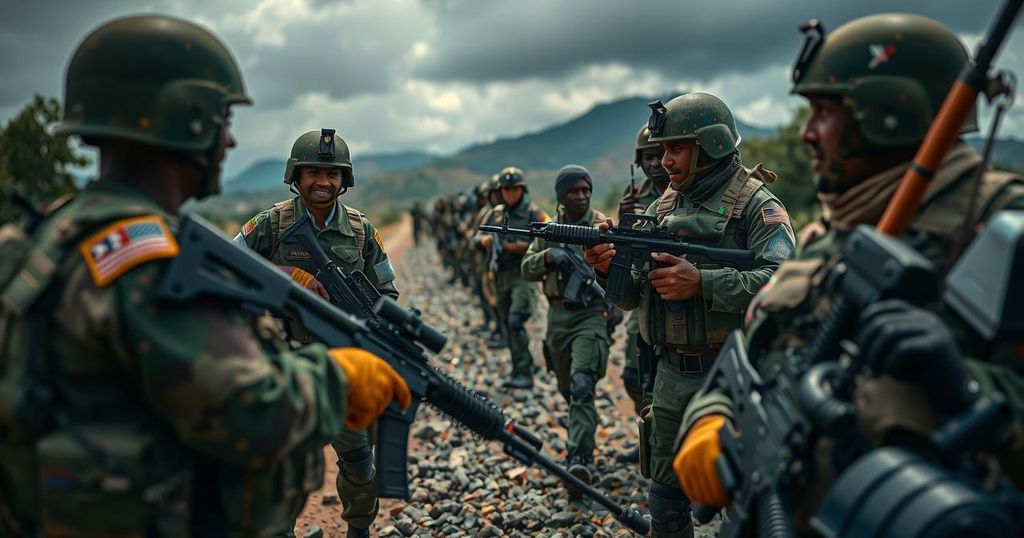Central African Republic Sees Significant Rebel Surrender Amid Peace Efforts

The Central African Republic has witnessed the surrender of several hundred rebels, prompted by deteriorating conditions and recent peace agreements with Chad. As local elections approach, the government aims to reintegrate surrendered fighters while launching operations against those who resist disarmament. The collaborative security efforts with Chad are expected to stabilize the region and support the election process, which has been delayed due to violence.
On Wednesday, the Central African Republic (C.A.R.) reported a significant development in its ongoing peace efforts, with several hundred rebels surrendering their arms to government troops and United Nations (U.N.) forces. This occurs in the wake of a recent agreement between the C.A.R. and Chad to jointly secure their shared 1,200-kilometer border. Government officials are optimistic about the possibility of conducting local elections, previously postponed in October due to escalating violence. The key motivations behind these surrenders include ongoing hardship and relentless assaults by government forces, compelling many rebels to abandon their cause. For instance, Mloubo Etienne, a former member of the Union for Peace (UPC) rebel group, expressed that the severe conditions and lack of food in the dense forests were unbearable. He indicated that many UPC fighters in the north are similarly inclined to surrender, particularly after Chad’s troops disrupted their essential supplies. C.A.R.’s Communication Minister, Maxime Balalou, confirmed that among the 105 rebels who surrendered in Bambari, the country’s third-largest city, many were affiliated with the UPC or anti-balaka groups. In another operation in Kouango, 36 additional rebels, including three women, were disarmed. Balalou further stated that those who voluntarily disarm will be transitioned to the C.A.R. Center for Disarmament, Demobilization, and Reintegration for social reintegration or for military training. The anti-balaka alliance has been active for around a decade, waging a guerrilla war. Government operations have largely focused on dismantling rebel hideouts, particularly those resisting surrender, with the ultimate aim of establishing a peaceful environment for the upcoming local elections slated for December 29, following the initial postponement due to security concerns. Officials from both the C.A.R. and Chad met in Bangui on October 23 to fortify their collaborative security measures along the border, with Chad committing to deploy its forces to prevent supplies from reaching rebel factions. The C.A.R. government has explicitly stated that any remaining rebels in concealed locations will face lethal consequences should they fail to surrender or disarm before government troops or U.N. stabilization forces (MINUSCA). The C.A.R. aims to encourage at least half of the estimated 21,000 rebels in the nation to surrender by the end of 2025.
The Central African Republic has been embroiled in conflict for over a decade, exacerbated by the presence of various armed groups such as the Union for Peace and the anti-balaka alliance. The complexity of the situation is heightened by humanitarian crises, with food insecurity driving many fighters to surrender. The C.A.R. government seeks to both establish lasting peace and hold local elections, which have not been conducted in 36 years, making this recent wave of surrenders a critical step in the peace process. Additionally, the collaboration with Chad aims to stabilize the region by preventing arms and supplies from reaching rebel factions.
The surrender of several hundred rebels in the Central African Republic marks a pivotal moment in the country’s pursuit of peace and stability. The collaboration with Chad to secure the long border and the commitment to reintegrate former fighters into society are significant steps toward restoring order. With upcoming elections, C.A.R. officials remain hopeful that the improved security situation will foster a more conducive environment for democratic processes. Overall, the government’s proactive measures and the cooperation with neighboring Chad are vital components in the ongoing efforts to pacify the region and facilitate the transition to peace.
Original Source: www.voanews.com








